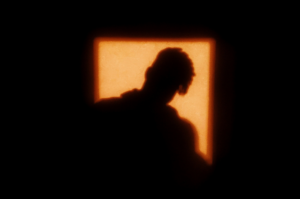
My father once taught me how to kill a fly; watch it till it perches steady, move both hands as close – and as slowly – as possible, then clap right above the fly. This way it would fly right up, into the collision of your clapping hands. Apparently, flies can piece together several images sent from their eyes to their brain in distinct flashes. They can process images faster than humans and hence, detect the slightest motion practically before it even starts. They are faster and sharper, but my father taught me that with patience and wit, they could be killed.
It might seem like a useless thing to learn, killing a fly. But just like with everything thing else in my life, Runo Gbemudu expected me to read into a deeper meaning. Killing flies wasn’t our only life course; he also taught me how to cut a fresh coconut – trim it as close to the top as possible, then chop a small neat square into it. He taught me how to iron a shirt – always start with the collar and press it like you would bathe a baby; delicately enough to evade harm, yet thorough enough to cover every inch. Our lessons were especially particular when it came to washing his 1998 E-class Mercedes, one of his most prized possessions. It was a blue-painted model that was far beyond its prime. He would always insist that I use very clean water and that I never, never washed the tires and body with the same rag.
As the years passed, more and more lessons were incorporated into our curriculum, usually in the same direction of efficient labour practices. The kind of thing a father would teach his male first child. Often, we deviated into more mature and impractical themes. Religion, societal values, ambition, and most prominently, women. Late into the evenings, we would sit on the soakaway pit, warding off mosquitoes as he drank small bottles of One Man Squad and lectured me on women and the paraphernalia of their personalities. While my young mind barely latched onto the largely adult concepts that he explained, I would listen with intent and the excitement of being regarded highly enough to be spoken to about grown-up matters.
The first woman that I knew in my father’s life was the one that birthed me, the first of many women that each came with their own lesson. My mother was a sharp contrast from the laid-back, reserved man that was her husband. To start with, she was hardly ever around. Runo Gbemudu sold motor spare parts in a make-shift workshop behind the house, so he was always home, but not my mother. Her early mornings and late nights at the market took up all of her time. These long days of absence were concluded by family dinners that were characterized by an over-packed sitting room, a daily dose of Lucky Dube music with a frequency that soon made my ears sore, and subtle arguments between our parents. Those subtle arguments soon grew into daily verbal altercations that often drew the attention of nosy neighbours masking their desires for drama with sprinkles of “I hope all is well”. I had returned home from boarding school one day to a poorly pieced together explanation from my three younger sisters as to how our mother would not be staying with us any longer. I carefully asked my father what happened, but Runo Gbemudu was not a man to be questioned. With his characteristic air of moroseness, he told me that there were things that I would not understand about women until I became a man.
The second wife wasn’t far off apparently. About six months later our home welcomed a new mother, although, elder sister would have been a more befitting term. Grace was so young that I often wondered if she was in the marriage by will or if she just needed a home to retire to after her days of tailoring. Her timid nature was uniform with her physique; a small woman with a slight back hunch, and a voice that often prompted us to mistake her for my youngest sister. All the same, we accorded her due respect, unwillingly but compulsorily. Grace was in her mid-twenties, and had hardly learnt the lessons of life before being thrust with the responsibility of materializing the values of a good wife. Being the ever-prominent teacher that my father was, he was willing to guide her through the process. Her marital privileges were not enough to secure her a different learning method from us. So just like with his children, my father scolded her. For every action, every mistake, every misplaced comment, she got a lesson. I can’t say that this woman taught us anything, yet there were lessons to be learnt. Even at a young age, I discovered that marriage could be as much of a confinement as it could be a utopia. One day my father told me that Grace had travelled and would not be coming back any time soon. Any further enquiry from me was met with a brick wall of resistance that was coated in silence, but echoed the usual anthem – you do not understand women yet.
Enter wife number three, Omegie. This one, I liked. She was warm and had a wild yet accommodating nature that was enough to colour our rather basic lives, but not so much that it would break the society-imposed confines of a ‘responsible wife’. Because while she was the outward and vibrant Omegie, she was still Runo Gbemudu’s wife. Moderation was key. Notwithstanding, she was great. She would always sing in her native Edo and, while I never understood, it was soothing to ears that had listened to too much Lucky Dube. It was this accommodating energy that saw her son from her previous marriage occasionally spend weekends with us, and Omegie always found a way to make our matchbox one-bedroom flat big enough for a market crowd. She was also learned, not just from being a teacher but also from a deep-rooted intellect that saw her take over from my father in a daily prescription of life lessons. Yet unlike my father, her lessons took on a more exonerative nature. She would tell us that we are allowed to fail sometimes without feeling like less of ourselves. She would tell us that we did not always have to sacrifice our happiness at the expense of others. She would tell us that our imperfections were our greatest strengths. While I initially thought that it stood against everything that my father taught us, the reality of it started to grow on me. I learnt from her that some people will be sources of light, and some will have the responsibility of absorbing light for others. Like the translucent church glasses that absorbed light and reproduced it into several beautiful pieces. Some people will be the sun and some the moon, and that was perfectly normal.
Apparently, her accommodating self was too accommodating, and about two years into their marriage she confessed to my father that she had been seeing another man. While this naturally created a sense of tension in our home, it strangely did not change my perspective or firmly rooted love for her. By now my advanced age had earned me a certain level of discourse with my father and with the little he was willing to give in our conversations, he reassured me that she would still be in our lives. But one day she left and never came back. I couldn’t find the words to ask why, because reassurance can often be a victim of circumstance, and disappointment left little room for curiosity. Besides, what did I know about women?
It was especially hard to transition to the next wife, Patience. Where a soothing and warm nature prevailed, there was now a gaping sense of a void and bland emptiness. Omegie’s absence especially left a barrenness that reflected on my father. His quiet evenings of One Man Squad had now turned into a full-on obsession with beer that he consumed religiously. At this point, we could not even talk the evenings away. When he didn’t sleep off in the strangest parts of the house, he would constantly poke me in the chest and suddenly feel threatened and angered by my 6’3 frame – “how will you be taller than your own father?!”. When he wasn’t questioning my physical build, he would cause trouble and chant military slogans while using his short stint in the Nigerian Defence Academy to fuel his claim of being an “ex-boy”.
Patience was not exactly helpful either. With my father lacking in his leadership roles, his new wife fitted into his position like a fish on a tree. The negligence would have been enough, yet she complimented it with wicked snares, harsh words, and occasional slaps to my younger sisters. Soon enough, Patience’s infractions had become known to our actual mother, who we had occasionally visited over the years, and who was also fed up with the nonchalance of our father. My mother was never in the habit of sewing her mouth, and as expected, she came by the house to voice her disdain.
That particular night was not much different from others, at least in the beginning. I had just sprayed through the house with insecticide and retired to the cool evening breeze of the balcony in anticipation of yam porridge. My father was out drinking and had just returned to sit at the balcony to recollect whatever was left of his normalcy, sulking, and occasionally throwing glances in my direction but never making eye contact. History had taught us that this was a long process, so we did not bother to set his food at the table until he specifically requested it. While in the middle of dinner, the rather quiet atmosphere was pierced with the shrieking and unmistakable voice of my mother. “Where are my children?! Tell that witch to bring my children out o!”
That was how our routine evening turned into a show of screamed insults and progressive aggression. Immediately, Patience locked the door and started returning the insults. While she said a lot of things, I only remember her telling my mother to stay out of her house because “your tenure has passed and this is a new regime”. Nonetheless, my mother continuously pounded at the door and punctuated her pounding with insults of ‘children snatcher’ and ‘stupid woman’. She also occasionally threw insults in the direction of my half-conscious father, who sat on the balcony and maintained a charade of “who is this woman?” Naturally, he must have done it in the spirit of sarcasm – to question her unexpected, tantrum-laden visit – but with all that Heineken that he had been drinking, I feared that my father might actually not have known who that woman was. By now there was a crowd, and the neighbours had all come out to ask if all was well. After a while, father had gotten tired of the drama and decided to come into the house. As Patience opened the latch to let him in, my mother burst into the house with the speed of a raging bull. She then snatched my sisters and shuffled them out of the house. She stopped midway, stared straight at me, and said “You, you’re a man now. If you come to your senses, come back to your mother”.
Later that night, after the storm had calmed, even the open terrain of the soak away pit was not enough to disperse the thick atmosphere that followed the preceding events. I sat there in silence, not quite sure about what to think about the dramatic night. Or the fact that I never had the yam porridge. Or the fact that I was suddenly the only child of whatever was left of our family. Patience was inside the house, still fuming from her outburst but quiet all the same. Quiet enough for my father to come sit with me for the first time in six years. He had a streak of empathy, maybe even embarrassment. He followed a heavy sigh with a long pregnant pause before finding the words, “Victor, you are now old enough to understand women. No matter what you do, marry the right one.” Those words were some of the last words that we shared over the years. The rocky course of life had taken me away from my father’s house into the realm of adulthood. Over the years, he and I fondled the fragile strings that managed to hold our relationship together. But once in a long while, I still reached out to him.
Today I visit him after seven years, our longest time apart. The house still has the void and empty nature that I remember. The soakaway pit has been renovated and the E-Class Mercedes is dustier than a mosquito net in harmattan season. Age and drinking have taken their toll on my father, but his mannerisms have not changed much because he has acquired a new wife whose name I do not bother to learn. Apparently, his taste in women has not changed much either; his new wife is cut from the same cloth as the last one, Patience – assuming there were none after Patience. I am here with a wife of my own and she is lovely, as far as wives go. She has deep-set eyes, full dark lips, and a distinct line across her nose from years of nudging it upwards. I do not introduce her as my wife. Instead, I say that she is a close colleague. My gullible father asks her what our workplace is like. But women sense the air that mixes between lovers, so his new wife sees right through my lie. It is written all over her expression. She must not like us very much, this new wife. She showers us with smiles and recitations of “welcome, my children”, but the look in her eyes fail to reconcile with her facade of kind words. I start to wonder what we may have done to stir her displeasure, but I soon drift away from her.
Now I am looking at my father. All through the night I desperately search his demeanour for a bit of the old him – any shrapnel of Runo Gbemudu that may have evaded the grip of the alcohol. I see nothing but an old man slowly moulding fists of pounded yam and dipping them in pepper soup. He would pinch off a handful, mould it at length, then create a small hollow in it, before dipping it in the soup. I soon become absorbed in the moulding and dipping, because of his precision and uniform movement. The balls of pounded yam are perfectly rounded and the hollows are neatly dented. The fish and meat in the plate of soup are carefully pushed to the side, allowing a small pool of pepper soup from which he evenly scoops away. Such a mere act of eating, yet he does it with patience and poise. Just like killing a fly.
Photo by Carla Anne on Unsplash










Ezinne Okafor August 19, 2023 13:22
A unique piece of content! You’re such a natural storyteller.